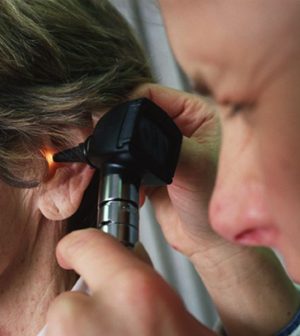- Recognizing the Signs of Hypothyroidism
- 10 Strategies to Overcome Insomnia
- Could Artificial Sweeteners Be Aging the Brain Faster?
- Techniques for Soothing Your Nervous System
- Does the Water in Your House Smell Funny? Here’s Why
- Can a Daily Dose of Apple Cider Vinegar Actually Aid Weight Loss?
- 6 Health Beverages That Can Actually Spike Your Blood Sugar
- Treatment Options for Social Anxiety Disorder
- Understanding the Connection Between Anxiety and Depression
- How Daily Prunes Can Influence Cholesterol and Inflammation
Most Older Americans Need Hearing Checks, But Many Aren’t Getting Them

Even though research has shown that at least 50% of older adults suffer some degree of hearing loss, a new study finds that most aren’t getting their hearing checked.
A national survey of more than 2,000 adults, aged 50 to 80, found that 80% said their primary care doctor hadn’t asked about their hearing in the past two years. Nearly as many said they haven’t had their hearing checked by a professional over the same time period.
The findings came from the National Poll on Healthy Aging at the University of Michigan’s Institute for Healthcare Policy and Innovation.
“Hearing loss can occur throughout life, but the risk rises with age as our ears lose function. Many people don’t realize they’ve lost hearing ability unless they’re screened or tested,” study author Dr. Michael McKee said in a university news release. He’s a family medicine physician and health services researcher at Michigan Medicine.
Men were more likely than women to say they’d had a recent hearing screening or test, and people aged 65 to 80 were more likely to say that than those who were younger, according to poll results.
But even among men and those older than 65, 72% hadn’t been tested.
Respondents in fair or poor physical or mental health were less likely to have had their hearing tested in the past two years, even though they were more likely to have hearing problems.
Overall, 16% of respondents said they had fair or poor hearing. But that rose to 28% among those who said they had fair or poor physical health, and to 31% among those who said their mental health was fair or poor.
And even though research shows that at least half of older adults likely have some amount of hearing loss, only 6% of respondents said they currently use a hearing aid.
There’s growing evidence that hearing is important to many aspects of life, ranging from dementia and falls to staying connected with friends and family, the study authors noted.
“Age-related hearing loss can have wide-ranging consequences, and can be addressed with assistive technologies, yet these data show a major gap in detection, and disparities between groups,” McKee said.
More information
The U.S. National Institute on Aging has more about hearing loss.
SOURCE: University of Michigan, news release, March 2, 2021
Source: HealthDay
Copyright © 2026 HealthDay. All rights reserved.










